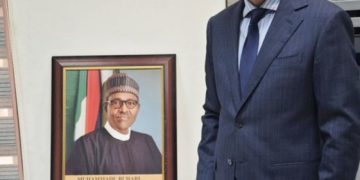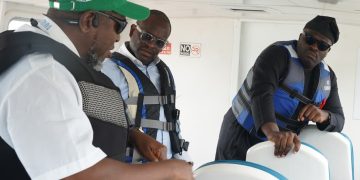- Cargo scanner at a seaport terminal
By Anthony Nwachukwu
The 100 per cent Compliance Team of National Association of Government Approved Freight Forwarders (NAGAFF) has petitioned the National Security Adviser (NSA), Nuhu Ribadu, alleging that scanning machine operators at the Western Ports were frustrating trade.
In the letter to the ONSA urging him to “swiftly call the terminal operators and their collaborators to order, the team accused the operators of “deliberately, purposefully and maliciously subverting the original plan and purpose of introducing scanning machines in cargo clearing processes,” thereby perpetuating physical examination.
The letter, signed by the National Coordinator, Dr. Ibrahim Tanko, accused some agencies, port concessionaires and public officers in positions of authority of undermining government’s efforts at securing the nation.
“You may recall that the rationale, purpose and original intention of introducing scanning machines principally was, among other reasons, to facilitate trade and ensure timely cargo clearing processes,” the letter read.
“The conventional method and, or idea, was for freight forwarders or agents to bring in their container-laden trucks to the scanning site, and after undergoing the statutory procedures and extant processes, would thereafter exit the port.
“If the container fails the scanning text, the agent takes his truck to the physical examination platform, where the suspected infractions, namely, wrong declaration, concealment and other noticeable infractions are referred to relevant government agencies or units for further actions.”
“Unfortunately, what we have and experience now is deliberate circumvention of the near-perfect arrangements of Cotecna in scanning of goods. This is obviously for parochial or pecuniary interest.
“However, the concessionaires have hitherto adopted a cumbersome style of ensuring and insisting on clearing agents using only their own trucks instead of the usual, conventional and fast method of using their (agents) own trucks.”
According to the team, the implication is that every scanned container is thereafter returned to the stack, irrespective of the examination status, making agents to pay so much in demurrage, hiring and paying for trucks twice.
It further alleged that if the scan result returns the container as suspect, the agent/owner is “subjected to another booking for physical examination at another fee to the terminal operator, making it double payment for a supposed single process. This cumbersome procedure breeds corruption and consequently poses security risk.”
It argued that if the platform meant for examination of containers is utilised, “the alarming seizures, such as the ones recorded in Port Harcourt, would have been prevented, because it would be detected by the scanning machine.”
The NAGAFF team commended Ribadu over the procurement of the scanning machines, stating that the association was drawing his attention to the unwholesome activities that have led to loss of government revenue, clogged trade facilitation, and with security implications.






























